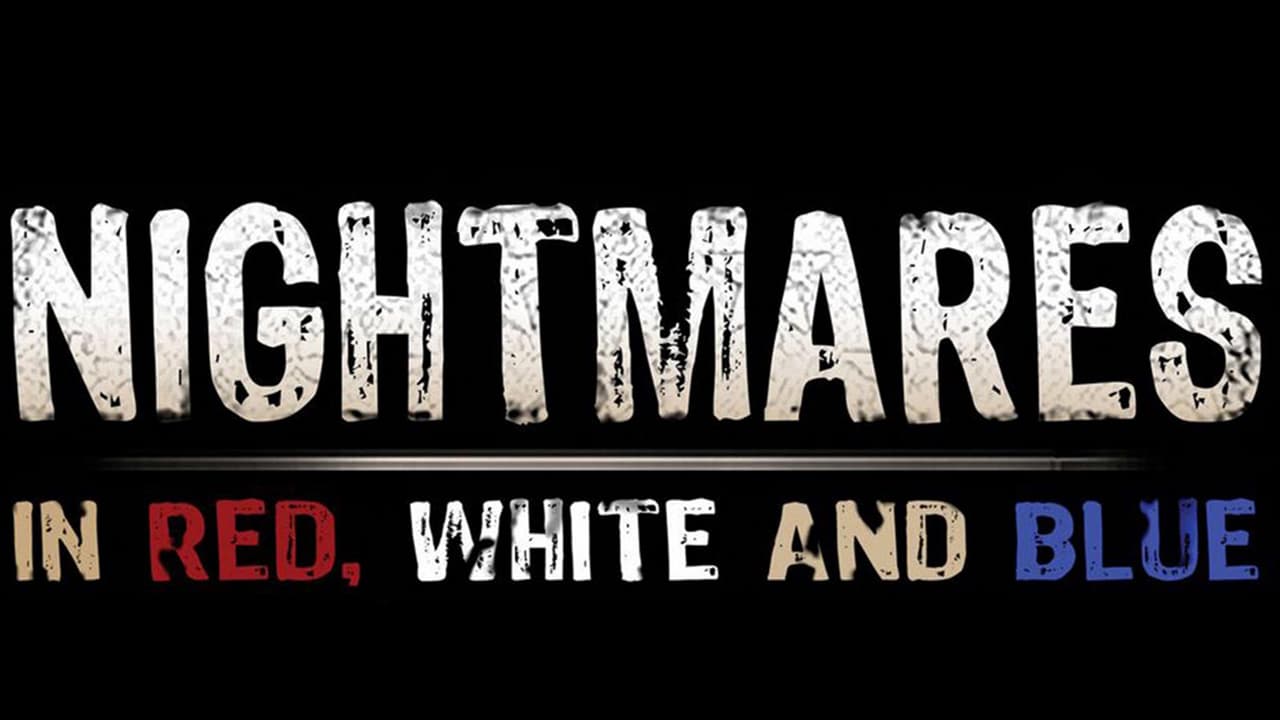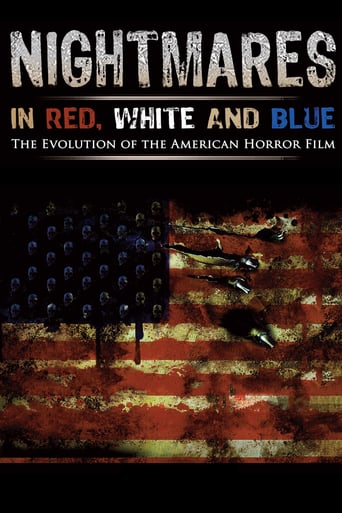

The beginning of this movie was actually pretty good; I enjoyed the discussion (albeit brief) of the birth of horror films. It got a bit muddled when it entered the 30's and 40's...I feel like they were trying to make too many political points where none really existed.When it got to the 50's, that's really when the politics overtakes the discussion of the movies. This is partially because most of the directors grew up in or started directing in the 60's and they were all counter-culture types. Normally when you watch a documentary about something, you get a full view, not an utterly biased piece of propaganda...I'm sorry, comparing Ronald Reagan to Freddy Krueger as the scariest person in the 80's? Really??? Most Americans would disagree - I mean other than the staunchest leftists who see Obama as too conservative still hold any sort of vindictiveness for Reagan.If you were looking for a documentary about how these films came into being or where the horror genre has been and where it's going...eh, you'll get a very thin layer of that. The directors they have in here spend way too much time discussing how important their relatively unimportant films were in establishing the political tones (who really looks at horror movies for politics?) and too little time actually discussing American horror films.It would have been nice for them to discuss how British horror films influenced American horror films (Universal competing against Hammer for instance) or how authors like Edgar Allen Poe, Shirley Jackson, and Richard Matheson provided much of the fodder for the horror films in the 50's and 60's...other than a passing mention of Poe, there is no mention of any author other than Stephen King.This is a poor attempt to document the history of the horror film genre. There are plenty of clips from films, but they are far too brief to really enjoy. Too little time is given to too many films for there to be any real depth here. Ironically, there is almost no mention of contemporary horror films that actually are worthwhile...namely independent directors and films that aren't just blood and gorefests. Oh well! Don't bother with this.
... View MoreYet again we are fed the same old treatment for a new decade. (The American Nightmare treaded much the same ground previously). Watching this latest 'historic' instalment of how cinema's arguably finest and most effective genre came into fruition, feels like a retread, nothing new, nothing challenged. Granted the first half of the 20th century is covered with enthusiasm, but it is when contemporary American horror cinema is tackled does this documentary fall flat, with an approach almost like first year academia.However, John Carpenter makes a perfect point mid-way through in that we give directors like Craven (for Last House on the Left) too much credit by saying that films like Last House on the Left was pure social commentary. Or like Eli Roth's criminally over rated Hostel. These are not great social comments on America.Indeed, Last House on the Left is an excellent film, but it is an excellent exploitation film and a film that can only be a product of its time - i.e. US cinema became more independent following the mid-60s boom, of which European cinema had been for many years. Before that, it had been controlled implicitly by a studio system. The horror genre will always thrive through independence.With Hostel, it is again a product of its time (okay it has trite, spoon feeding themes in it, but still ). It is a reaction to how desensitised audiences have become with the genre, a marketable push again by Hollywood studios to cash in on real issues - it's painful really, and a reason why the sludge of American horror cinema at the moment is truly woeful.Another point made here also was that the barrage of updates/remakes of 70s horror has become more gory and violent linked to events in the world .don't give me that, it is purely that we are used to dumbed down violence, not just from news reports but by the need to shock and go one step further with what has previously been made, typified again by the US studio system (can you imagine a remake of Texas Chainsaw Massacre with no blood in it, ironically like the original - the studios wouldn't take the risk). The US studio system would remake anything if they could, but the marketable agenda is largely ignored. If the point was that these remakes reflected social ills, why is it that the slew of far Eastern horror, mainly from Korea and Japan, are tame versions of their original sources, not bloody, shocking versions. It is studio tactics, nothing more, nothing less. It is of no coincidence that the far Eastern originals are far superior, particularly as effective examples of the horror genre.Ultimately, the real depth to US contemporary horror was missed here again with this doc. We've heard the same trite academic stances before, over and over, with no counter argument. It is worth noting, and ignored in this documentary, that 70's US exploitation cinema is just as important in the history of the American horror film. Exploitation cinema exists outside of the studio system, away from franchises, pushing boundaries and normal expectations, much in the same way that there is a wealth of amazing European exploitation films (Italy, Germany and Spain being obvious sources of origin, yet many more beside). This brought to American cinema, certainly through the advent of the drive-in cinema and grindhouse picture house, a tidal wave of cinema free to explore any avenue, upping the ante of what audiences consumed.Despite its enthusiasm, and with the usual suspects (Carpenter, Romero, Dante et al) being interviewed, all this documentary really tells us is the historic arc of marketing the horror film .and for that motivation, misses the point entirely.
... View MoreEh, you could do worse than the Nightmares in Red, White and Blue documentary.After a great opening, I thought I was headed toward an informative, inventive and exciting doc on horror movies in the U.S. (Which by the way, isn't all state-side but still )Unfortunately, it got boring and provided information that kids that grew up in my era (or before) already knew. Little was provided and they jumped all over the place in the horror genre and skipped large chunks while just barely mentioning them. (Very little attention was given to huge leaps in the horror staples: Scream and The Blair Witch Project – which both, like 'em or hate 'em, they're enormously significant in the past few decades of scary cinema.)It's only 96 minutes, so I would recommend just a Saturday afternoon killing-time horror documentary.
... View MoreThis review may seem as though it outlines the entire documentary, but believe me, it only scratches the surface. :) No spoilers to be had here! The pros: There are some interesting clips with some horror heavy-hitters - George Romero, John Carpenter, Mick Garrison, Joe Dante and more - interspersed with clips from everyone's favourite scary movies. We catch glimpses of other great talents behind the stories, too, like Tobe Hooper, Wes Craven, David Cronenberg and Stephen King. And when the description of of the documentary says that this is the history of the American horror film, they're not kidding: we're shown clips from the very first "Frankenstein" in 1910, through the classic Monster Movies ("Dracula," "The Phantom Of The Opera," "The Wolfman," "King Kong" and so on) all the way up to much more contemporary films, like "Se7en," "American Psycho," and franchises such as the "Saw" and "Scream" films. It's all narrated by the great voice of Lance Henriksen, who takes us on a chronological journey through what has been popular in American theatres since the silent film days and gives context to how (and why) we got from there to here.The cons: I felt it was too short for the ground it wanted to cover; a three-part series would have allowed more time and space to get into what each director wanted to say, rather than limiting them to sound bites. Also, for me, a lot of the attempts to politicize the evolution of horror films feel ham-fisted. Saying that Freddy Krueger's "making the children pay for the sins of the father" was a mirror of what Reagan was doing in office at the time? Tying in the ever-more excessive gore of the remakes like "Texas Chainsaw Massacre" and "Dawn Of The Dead" with the media coverage of the wars in Iraq & Afghanistan? Commenting on how there's a new moralistic level to horror films like "Saw" because victims now have "the power to choose"? "Hostel" being nothing more than a metaphor for xenophobia? According to some of the critics and writers giving their two cents, every horror film is made to have a moral (yes, they even manage to moralize "Gremlins" and Poltergeist"!). It's all a bit of a reach, really. Certainly art imitates life, though I wouldn't go as far as some of these guys do. Perhaps its brief running time adds to the problem, as each of the examples I gave above are no more than one line out of the entire documentary.Still, none of the cons take away from this being a fun and entertaining look into the history of scary movies. If all you're seeking is 90-ish minutes of great nostalgia (or a crash-course intro to horror), along with some face time with many of our favourite directors of the genre & clips of a whole lot of films that'll make you think, "Oh, I need to rent that again!"...then this is definitely for you! ||| ***½ out of 5 ||| ******½ out of 10 |||
... View More